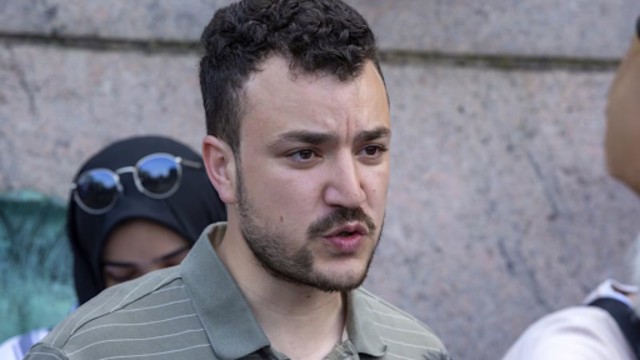
Mahmoud Khalil, a student representative, was spotted at a pro-Palestinian protest camp on Columbia University's campus in New York on April 29, 2024. AP Photo
Mahmoud Khalil, a graduate student at Columbia University, may now face deportation. An immigration judge in Louisiana made the decision on Friday. The judge agreed with the government’s claim that Khalil could cause serious problems for U.S. foreign relations.
Judge Jamee E. Comans said the government gave clear and convincing reasons for his removal. Khalil took part in pro-Palestinian protests, which led to his arrest and detention.
Khalil’s lawyer, Marc Van Der Hout, said they will appeal the decision soon. He told another judge in New Jersey that the appeal will go to the Board of Immigration Appeals.
“So nothing is going to happen quickly,” the lawyer added.
At the hearing, Khalil spoke directly to the judge. He said the court had failed to provide basic fairness and due process. He believes his case was mishandled and unfair from the start.
“This is exactly why the Trump administration has sent me to the court, 1,000 miles away from my family,” Khalil said.
His lawyer also criticized the entire legal process. “Mahmoud was subject to a charade of due process,” he said. “This was a weaponization of immigration law to silence dissent.”
Khalil, who holds legal U.S. residency, was arrested on March 8. Federal agents picked him up from his university housing. It was the first arrest under a crackdown on student protesters.
The next day, he was flown to a detention center in Louisiana. His attorneys and pregnant wife, a U.S. citizen, were left far behind.
Khalil’s legal team says the arrest goes against the First Amendment. They claim he is being punished for speaking out, not for breaking any law.
Secretary of State Marco Rubio used a rare legal power to justify Khalil’s removal. The rule allows deportation of people who may harm U.S. foreign relations.
Khalil’s lawyer said that has nothing to do with foreign policy. He argued that Khalil is being targeted for his views, not his actions.
Khalil was born in Syria but is of Palestinian origin. He grew up in a refugee family. His grandparents were removed from their home in Tiberias.
He hasn’t been accused of any crimes during the protests. Still, the government claims his actions support antisemitic and pro-Hamas beliefs.
Khalil served as a spokesperson for students at Columbia. They protested on campus against Israel’s military actions in Gaza.
The university asked police to clear the protest camp after some students took over a building. Khalil wasn’t part of that group. He also wasn’t arrested at the time.
But photos of him without a mask and his open interviews got wide attention. Some critics accused him of supporting terrorists. The White House also made strong claims, though it offered no proof.
Judges in New York and New Jersey have stopped his deportation for now. Khalil’s legal battles are still ongoing.
The Trump administration is also taking away over $400 million in federal funds from Columbia. Officials claim the school failed to stop antisemitism during the protests.
Some Jewish students said they were harassed or excluded during the demonstrations.
Other protestors have also been arrested or deported. This includes students, professors, and scholars at other universities.















